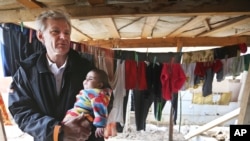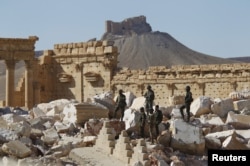A senior U.N. official is accusing the Syrian government of refusing permission for relief agencies to distribute humanitarian assistance to hundreds of thousands of vulnerable Syrians in blockaded and hard-to-reach areas.
U.N. special adviser Jan Egeland calls this past week very disappointing. He says the United Nations has been waiting for four days for the Syrian government to give the green light for the delivery of aid to 287,000 people in besieged and hard-to-reach areas.
Egeland says five convoys of food and other essential relief supplies are waiting for the go-ahead.
He says aid agencies only have been able to deliver supplies to 45,000 people during the past week. He says opposition forces also have blocked the entry of some relief. But he says the government bears the major responsibility for this impasse, since 15 of 18 besieged areas are under its control.
Egeland says access to these areas is particularly crucial as the United Nations is entering the intensive phase of a big national vaccination campaign.
“There are problems in many places in going as planned. The appeal to the government and to the armed opposition groups, do not stop our volunteers and our health workers that are to vaccinate millions of children for epidemic disease," said Egeland.
Egeland says the one positive note in this otherwise grim scenario is the United Nations likely will be able to do major evacuations of wounded, sick, and their relatives from four towns under siege in the near future.
“Altogether, it could be up to 500 people. It is one of the biggest medical evacuations that have been planned. We hope it will happen, because it will happen from places where people have recently bled to death, died totally unnecessary because there were no medical evacuations," he said.
Egeland says in this situation of life and death, medical evacuations, medical assessment missions, and assistance, should be routine. He says they should not be one-time situations or be used by the warring parties for political purposes.





